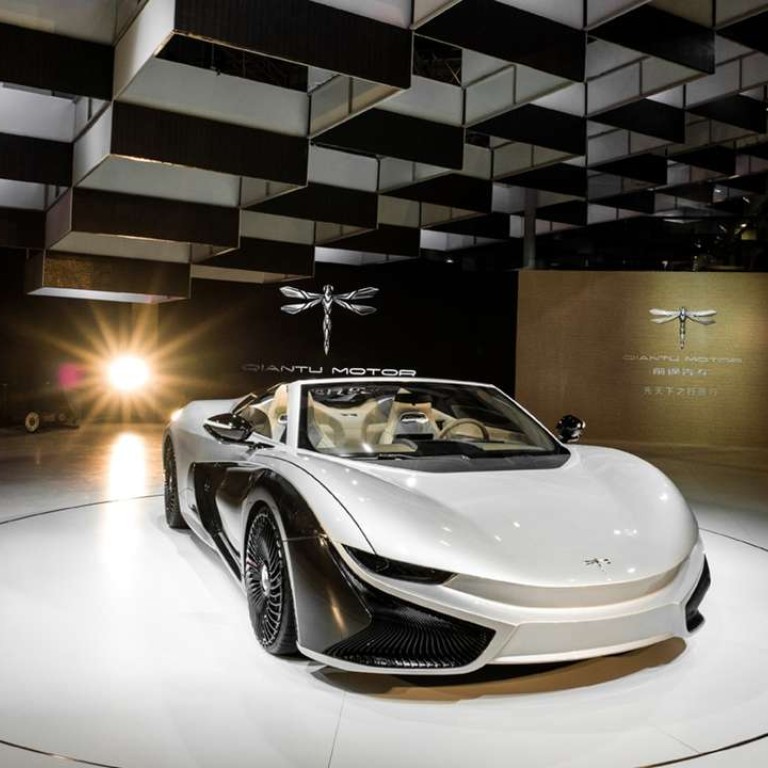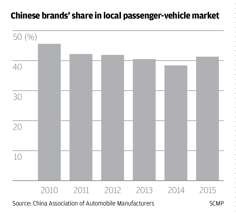
Analysis | Internet start-ups, social network firms pile into making cars to redefine China’s future of mobility
Technology companies are making multibillion-dollar bets in electric vehicles, self-driving cars and connected transportation
China’s internet game designers, social networking start-ups and video streaming companies are piling into the business of making cars, aiming to use their technology to disrupt a century-old industry and redefine the future of mobility.
They are making multibillion-dollar bets in three growth areas: engines run on electricity or other alternatives to petrol; self-driving or assisted-driving cars; and vehicles connected to the internet and other devices.
Working in their favour is the world’s most populous country and largest vehicle market, where three decades of economic growth has created the insatiable demand for the latest, the fastest and the best cars. Add to that a state target for one in four vehicles on Chinese streets to run on both petrol and electricity by 2030, and that is a lot of opportunity.
“[Shaping the future] you need innovations, entrepreneurship and support from the government to create the regulatory framework. All of those things are in China today but not in Europe. Not so many [of these elements] are in the US,” he said.
Shenzhen-based Future Mobility is working on a self-driving car, aiming to put it in US and European showrooms by 2020, according to Breitfeld, a 20-year veteran of BMW who led the team that built the German carmaker’s i8 line of electric vehicles.

Self-driving technology today is developed in the Silicon Valley and can be applied to many cars, so the next question is how to make it work on the roads. China was a good testing ground for the technology, Breitfeld said.
“The technology is more or less done, but you need to collect digitalised and very precise data. You also need pilot programmes for testing and regulatory framework to make it better and better. China is a huge market with many users and different driving conditions, so you can get so much data for improvement,” Breitfeld said.
Tencent – which has also invested in another Chinese vehicle start-up, NextEV, to rival Tesla Motors – is not the only Chinese internet company venturing into making cars.
LeEco Group, the closely held owner of China’s largest video streaming company, has invested in a carmaker in the Silicon Valley called Faraday Future.

LeEco’s founder Jia Yueting has built his business around the connectivity of different units, between video streaming, ride-sharing and cellular phones. He wants to bring connectivity to the transportation arena and lead the industry.
The LeSee vehicle will not be just a mere transportation tool, but an integral part of LeEco’s ecosystem of electronics hardware and software. Passengers in a LeSee could sit back and surf the net or watch a film while the car drives itself to its programmed destination, according LeEco’s vision.
The motor, control and battery technology on the LeEco car will be equipped by Aston Martin, the British luxury carmaker.
A fleet of LeSee vehicles could also be integrated into LeEco’s Yidao Yongche ride-sharing service, the company’s global corporate finance head Winston Cheng said in an interview with the South China Morning Post.

Among the carmakers aiming to make it big is a start-up called Qiantu Motor, backed by Chinese car design studio CH-Auto Technology.
Qiantu is working on a two-seat roadster called the K50, using a lightweight carbon-fibre monocoque body similar to that used by Lamborghini’s Aventador sports cars. The company aims to put the K50 on Chinese roads next year and eventually sell it in the US.
“It’s clear that we need to catch up with foreign carmakers in terms of quality,” said Qiantu chairman Lu Qun. “It’s too early to say whether the technologies of Chinese carmakers can lead the trend in the US or bring changes to the US market.”
To match global standards, Baidu in September received regulatory approvals to test its driverless cars in California. The company, the dominant Chinese internet search company that also has a business in food delivery using its Baidu Maps application, is aiming to start mass production of its driverless cars in five years.
Alibaba Group Holding, the world’s largest online shopping platform and publisher of the Post, has unveiled an internet-connected car with General Motors’ Chinese partner SAIC Motor Corp.
The web-enabled car, a sport-utility vehicle model under SAIC’s flagship brand Roewe, is the first to run on Alibaba’s home-grown operating system YunOS.

Driven by the rapid internet development in China, the innovation in internet-connected car in the country was likely to outstrip the US, Wang said.
While the US car market was less challenging than that in China, carmakers had fewer initiatives in innovation, he added.
“Chinese carmakers are facing more challenges amid competition, which is pushing them to be more innovative. So in the future they will be able to make a car equipped with advanced features that are not available in the US, and then they can sell their cars to the US and it’s possible that Chinese cars can lead the vehicle trend in the US,” he said.
Tesla’s success came along with its innovation, and so Chinese carmakers could lead the market trend as they were moving fast in developing technologies in electric vehicles and car connectivity, Wang said.

BAIC Group, the Chinese partner of Hyundai Motor, began putting 20 driverless cars on a 22-kilometre stretch of road in Panjin city in Liaoning province in October, making it the first to introduce commercial use of self-driving vehicles in the country.
The carmaker, which assembles Hyundai’s Elantra and Sonata cars, wants to begin mass-producing self-driving cars by 2020.
Rong Hui, vice-president of BAIC’s New Technology Institute, said the company was also in talks to launch a similar pilot overseas.
Rong said the driverless technology could penetrate China’s vehicle market faster than in other countries.
“Applications of new technologies have been developing very fast, and mobile applications are a good example. As a new and mature technology, I believe that self-driving cars can become more popular in China than in other countries,” he said.
Additional reporting by Zheng Yangpeng



